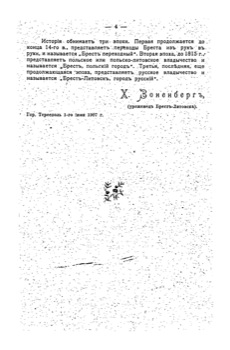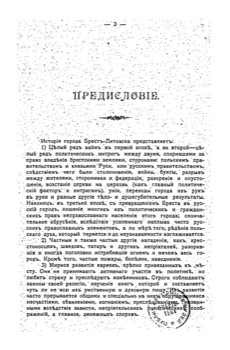The proud history of Brest-Litovsk is composed of:
1) A series of wars in the first epoch. Then, in the second epoch, a series of political intrigues between two [parties], [primarily] disputes over the ownership of the Brest lands. The parties were: the Polish government and the princes of Russia, i.e., the Russian government. There occurred, as a result of these collisions, war, riots, divisions among the residents, versus supporters of the federation; ruin and devastation, the uprising of one church [Polish Catholic] against another church [Russian Orthodox] (as a major political factor and schemer), the union. The city was passed from hand to hand, and various other body– with devastating results for the population.
Finally, in the third epoch, with the transformation in the Russian city of Brest, depriving many of the non-Russian-Orthodox population of political and civil rights, the final Russification, purely due to the increased influx of Russian Orthodox elements, with a reduction of the Polish spirit –which was lost, obliterated beyond recognition.
2) The city was attacked by armies, private and otherwise, e.g. by Crusaders, Swedes, and Tatars. These and other enemies were destructive to the city and sometimes threatened with fire and sword extermination of the entire city [population]. On top of these: frequent fires, disease, floods.
3) The peaceful development of the Jews, who are tightly bound to their homes. They do not actively participate in politics, but love the country and pursue traitors. The Jews strictly observe the laws of their religion. The study of [religious] books is almost all their entire mental-spiritual nourishment. The Jewish communities were frequently affected by both general maladies and those specifically directed at them: [social, physical] deterioration, misfortune, charges, expulsion, harassment caused due to envy, hostile political considerations... Most importantly, disputes over money.
 |
| Page 4 |
The author divides the past of Brest into three epochs:
• First, The Brest-Transfer Period – from the beginning until the end of the 14th century when the town passed into new hands.
• Second, Brest was a Polish town, from about 1400 until 1815, during which Brest was under Polish or Polish-Lithuanian hegemony.
• Third: Brest Litovsk – a Russian Town, under Russian rule and influence, up until the present time.
The author signs his name in Russian, Kh. Zonnenberg, and –below, in parenthesis– declares himself a native of Brest Litovsk. The final line gives the place and date of completion: Terespol, 1 June 1907.
Terespol was (and is) across the Bug River from Brest and may be considered an outlying suburb of Brest. Currently Terespol is in Poland.



